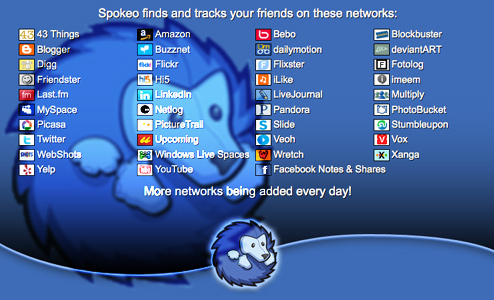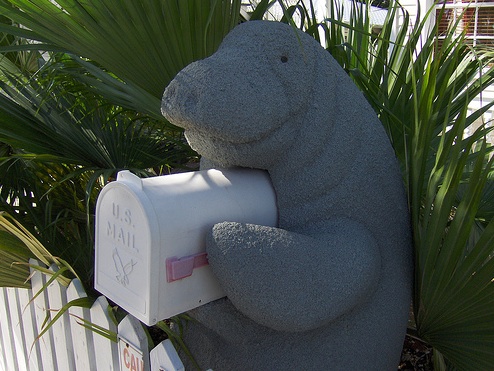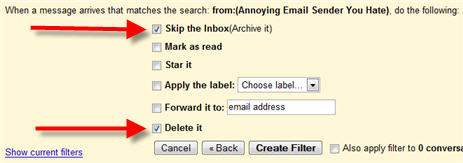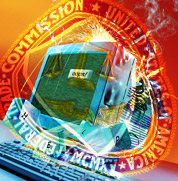Matthew wrote in to complain about a new website called Spokeo, which sounds like a stalker’s dream: it sucks up all the entries in your address book, then returns a Big Brothery smorgasbord of all the publicly accessible accounts and services linked to each email address, along with updates any time something happens. It might surprise you to see just how easy it is for someone to assemble a picture of your Internet footprint with only an email address.
Don’t like the sound of that? Luckily for you, someone has already been inspired to follow Spokeo’s model and create a tool—Identifight—that lets you track your own email address to see what shows up, so you can patch up privacy leaks.

Identifight Tells You What Sites Your Email Address Is Publicly Linked To
Peachtree Doesn't Believe You Really Wanted Off Their Mailing List
Peachtree must have a hard time keeping people on their email lists if they have to resort to this. Reader Chris writes:
I registered my Peachtree accounting software, and started receiving e-mails from them. I unsubscribed, and thought I was done. Today, a few weeks later, I received this e-mail: Please re-confirm your opt-out status…
../../../..//2008/03/26/yahoos-unlimited-email-isnt-wsj/
Yahoo’s “Unlimited” email, isn’t. [WSJ]

This Is Why Phishing Works
The following (sad) letter yesterday from reader H demonstrates why phishing works:
Dear Sir:

8 Ways To Opt Out Of Junk Mail Lists
Direct mailers don’t believe in the concept of opting in, so if you want to cut down on the amount of straight-to-the-trash mail you receive, you’ll need to contact them directly and request that your name is removed. ForestEthics—the group behind the Do Not Mail Registry petition we blogged about earlier, has gathered several ways to contact the offending parties.

Pepsi & Amazon Won't Fix PepsiStuff Error, Keep Ignoring Customer
Jon saved up a bunch of PepsiStuff points and decided to redeem them for an item PepsiStuff is promoting on its website. That’s how these point redemption programs usually work, you see. PepsiStuff.com apparently thinks otherwise—they’ll let you redeem the points for a COBY player (ha ha ha ha), but the Sony alarm clock is just redemption bait. You’re not supposed to actually pick that.
../../../..//2008/02/20/a-reader-tried-to-send/
A reader tried to send in his shipping info to Monster Cable yesterday to receive their free HD informational DVD, The Higher Definition Home Theater Experience (see second to last paragraph), and discovered the address wasn’t working. Now it is, so if you got your email bounced back, try again.
Massive North American Blackberry Outage
Blackberry smartphones are screwed up! There’s a massive outage going on in “the Americas” says RIM.

Charter: Sorry We Deleted Your Email, Want $50?
There is no way to retrieve the messages, photos and other attachments that were erased from inboxes and archive folders across the country on Monday, said Anita Lamont, a spokeswoman for the suburban St. Louis-based company.

Activision Accidentally Introduces 860 Customers To Each Other
Consumerist reader chrismar was one of the Guitar Hero customers who requested a Wii replacement disc from Activision last month. On January 18th, the company sent out an email to its customers with an update on the disc replacement program. The problem is, they copied 859 other customers on the email. “As a result, my email address is in 859 unknown hands, and I have 859 email addresses I don’t want.”

How To Reset Your Password If Your Yahoo Account Is Hacked
A friend of a friend’s Yahoo account was hacked and now all the guy’s personal and professional contacts are getting emails saying that he’s stuck in Africa and needs to be wired money immediately. Here’s some solutions we found that might help him reset his password.

WaMu Doesn't Care That Your Email Address Is Listed On Some Random Guy's Account
I was hoping I’d never have to write to The Consumerist about a company giving me grief. I never expected that it would end up being a company that I have absolutely no connections to that forced my hand.

Google Thinks Spammers Might Be Giving Up
Brad Taylor, Google’s chief spam “watchdog,” suspects that spammers may actually be giving up as filters becomes more sophisticated and fewer of their messages get through.
Google won’t disclose numbers, but the company says that spam attempts, as a percentage of e-mail that’s transmitted through its Gmail system, have waned over the last year. That could indicate that some spammers have gotten discouraged and have stopped trying to get through Google’s spam filters.
Other experts disagree, claiming that spam is on the rise.

Phishing Scams Hurt The Brands They Target
Ars Technica reports that “42 percent of adults in the UK feel that their trust in a brand would be greatly reduced by receiving a phishing e-mail claiming to be from that brand, according to an online survey conducted by research firm YouGov.”
../../../..//2007/11/19/considering-googles-penchant-for-automated/
Considering Google’s penchant for automated emails and redirects to Help files when things go wrong, what would you do if someone hacked your Gmail account and had access to all your emails, Google documents, etc etc? [Google Blogoscoped]
How Gmail Stops Spam
My spam has gone down like a million % since switching to Gmail from Yahoo mail. This amusing video shows you some of the techniques Google uses to keep spam out of your inbox. Just about all the spam we get is as a result of the forward set up from our old yahoo to our new gmail account.

Don't Open Email From FTC "Fraud Department"—It's Virusy
The FTC has made a big to-do about fighting spammers and identity thieves, so naturally the underworld’s response has been to release a spoof FTC email into the world that is loaded with bad virus things that will attempt to steal your personal info. The FTC is urging everyone to not open this email. But you already don’t open unfamiliar attachments from people you don’t know, right? If you answered “No,” we have a shrink-wrapped hard drive from Best Buy we’d love to sell to you.


